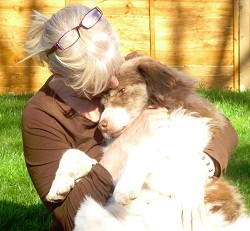Valgrays Border Collie Rescue Needs Your Support
Val Phillips founded Valgrays Border Collie Rescue back in the 1970's. As the chief poop picker-upper, dogs-body, driver, and groom, Val is mad about her dogs and the care she gives to them is a wonder. To watch her work with the most feral/neglected/beaten/terrified dogs and turn them around is a gift that not many people have. But as with any other charity - Valgrays Border Collie Rescue runs entirely on donations from the public.
Recently an appeal was put out for a much-needed boost to the feed pile, for all the dogs that Val has in her care. 
The response was amazing and Valgrays would like to thank everyone for their generosity and kindness in this time of need. This crisis has been averted short term but more is needed to help Val and her team keep going in their quest to rescue and re-home as many dogs as possible.
Support Valgrays Border Collie Rescue today
Many people are unaware of the needs of the Border Collie, compared to other dog breeds. Val is careful to match the needs of her rescue dogs with the people wanting to adopt so that they get a 'forever home' and do not keep finding themselves back on the shelf... or in the pound. For more information visit www.valgraysbcrescue.org.uk or find Valgrays on Facebook
Before getting a Border Collie it is a good idea to get some background information on the breed.
Many people misunderstand the Border Collie and its behaviour patterns. so this is a brief insight into some of the aspects of owning a Border Collie: -
Remember what the dog was bred for - TO CHASE AND HERD. This instinct varies from collie to collie but we should always assume it is present. Do not allow the dog to chase people, children, cats, cars, bikes, trains, or livestock. As a new owner the dog will not see you as having the right to control it's behaviour. Remember that the more exercise and excitement that you give a Border Collie, the higher its adrenaline levels will be. It can take weeks/months for these levels to come back to normal. Puppies under 7/8 months should have very little walking on leads. Short sessions of up to 20 minutes only. (You wouldn't take a toddler on a 10-mile hike would you?) Adult collies need a fair amount of exercise off the lead, which needs to be filled with events which make it think. Build up time slowly, as obedience and muscle develop.
Collies will anticipate your actions so during the walk call the dog, put on lead and then release, don't wait until the walk has finished to produce the lead, he'll know it's home time and run off. Physically prevent the dog from chasing, by keeping it on a long line, which you can reel in. Teach the dog to find things, hide a tit-bit and play "find it". Great game for rainy days.
Keep your collie well socialised. If it shows fear of anything by barking, lunging, bolting, hiding, DO NOT touch the dog, walk on - assuming its on a lead, say nothing. Do not expose the dog to stress. If you speak to the dog or touch it, you are praising it for that behaviour. Teach the dog that being with you is better than anything else. You will need to be interesting. Tit-bits, games. Offer alternative behaviour to the unacceptable ones. DO NOT use check chains or half checks, force, punishment, shouting, or smacking.
Collies and small children together are a potential problem. Toddlers are on the same eye level and stare. This is a challenge to any dog, particularly a collie. Children make high-pitched noises and sudden movements which can trigger collies. The dog must not be allowed to run up and down with children. It will get more and more excited and start jumping up and pulling at clothes or try to herd the children by nipping.
A collie must be kept occupied or it will go self-employed. Indoor kennels are great to give the dog a safe den. Leave it something it can chew and remove the toy when the dog has something else to do. Their toys are your toys. Retain at the end of the game. Collies like to be part of the team and crave companionship of humans.
Don't leave a collie alone all day. Three to four hours maximum for an adult, providing you give quality time later. Don't let the dog follow you from room to room, it should spend some time in it's bed alone when you are in. Chewing is common, boredom or separation anxiety Is often the cause. Shadow chasing is common in collies. Distract, remove source of light rays if possible and offer an alternative - stuff a kong, activity ball or buster cube. Collies are problem-solving dogs, give them problems to deal with other than fetching the washing off the line. You can teach a collie tricks. Closing doors, taking the video out of the recorder - there's no limit except your imagination and patience.
REMEMBER - IF YOU HAVE A BORDER COLLIE MAKE SURE THE IQ IS ON THE RIGHT END OF THE LEAD!
Courtesy of BC Trust GB